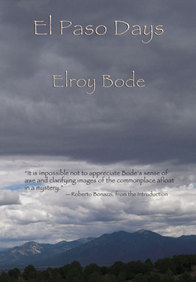If one were to look back on a life as collected memories, how would those memories be recalled? Elroy Bode's memoir, El Paso Days, shows that life is relived not chronologically, but randomly, as recollections and experiences, joys and sorrows. The author takes the reader on a pinball ride, bouncing between his life as a teacher to the ennui of retirement. It is an anthology of moments, collected fragments of time and space. The title leads the reader to anticipate a memoir about life in Texas, a literary landscape of arroyos and tumbleweeds. While El Paso is the backdrop, the book is a memoir of a piece of Bode's life, a nonlinear autobiography, seasoned liberally with the author's musings about life, death, and the cosmos. The reader travels across the timeline of Bode's life, stopping to observe a remembered event here, a cherished vision there. He explains in the opening note that his book is "a journal of thoughts, scenes, happenings, sort of month by month: not a record of a specific year but a kind of recent generic year." Through these scenes and thoughts we see a portrait of the author, somewhat abstract, with pieces missing, owing to the prevailing undercurrent of loss. That Bode suffered a loss is evident from the beginning. Early in the book Bode makes an oblique reference to his son Byron's suicide, without detail or further comment. The reader is left to speculate – like a bystander at the edge of a crowd of onlookers at the scene of a terrible accident – on what has happened and who is to blame. Bode's silence feeds the suspense, yet, at the same time, the reader respects his privacy in this moment of grief. Bode himself searches for meaning to life and death, at one moment giving in to despair – “It is as if I am a building and I am made up entirely of elevators. Each one is loaded with sadness, and they are all going down" – the next moment finding hope in the written word. Such is the nature of the seesaw, stream-of-consciousness pattern of the memoir. Bode does favor the reader with moments of lightness, however. Most of these take place in his backyard sanctuary, "a background of spacious greenery: pomegranate tree, Banks' rose, almond tree, and – like a textured rug – the spread of well-watered grass." He recounts with humor the memory of a romantic rendezvous between Wilson and Ernie, two pet turtles; and of the indolent Mojo the cat, "settled for the day into her white-mat retirement home." These light elements painted on the dark canvas create a view of Bode’s existence as a chiaroscuro landscape. Bode observes his life through varying wide angle and telephoto lenses as he studies both microbes and galaxies in the hopes of understanding his existence. The narrative alternates between past and present tense, and the reader slides back and forth through time, stopping at seemingly random events. The gravitational force holding Bode's universe together is the thread of sorrow and loss, and the unspoken promise that all will be revealed in the end. Bode writes, "I've been like an old farmer-guy sitting alone on his front porch, whittling on his piece of pinewood day after day and staring out into the fading afternoons. The days pass, and the shavings from his whittled stick accumulate by his cane-bottomed chair." As I read El Paso Days, rummaging through the "word-shavings," I came to know this "old farmer-guy." I felt his joys, and his pains. I saw his fragmented world become whole in the end, with the revelation of his real story. By the last page, the farmer felt like a dear friend.
1 Comment
Donald Mace Williams
5/20/2015 05:05:11 am
Leslie Martinelli--Congratulations on that perceptive and expertly written review of my friend Elroy Bode's book. He and I wonder how in the world the book got as far away as New Jersey, and I, because I am always interested in good writing, would appreciate knowing a little more about you. Would you tell me what else you've written, where you're from, and whether you're a student, a faculty member, or neither?
Reply
Leave a Reply. |
Archives
July 2024
Categories
All
|
|
Glassworks is a publication of Rowan University's Master of Arts in Writing 260 Victoria Street • Glassboro, New Jersey 08028 [email protected] |
All Content on this Site (c) 2024 Glassworks
|


 RSS Feed
RSS Feed
